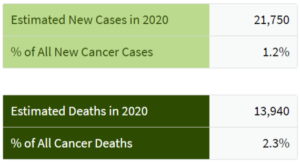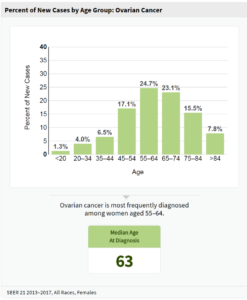
Why can’t healthy women scared of ovarian cancer just have their ovaries removed instead of going through life afraid of getting this often-fatal disease?
There are women who have fixated on this monstrous disease and can’t help but fear that they’re going to “get it.”
Women with risk factors are more likely to engage in this fear, such as never having had children, menstruation before 12, menopause after 55, obesity, smoking and having had breast cancer, among other risks.
Why not just have both ovaries removed to end this anxiety?
Let’s assume that this woman already has had the children she wants or doesn’t want kids.
Usually when ovaries are removed in a premenopausal woman, in the name of preventing ovarian cancer, it’s been determined that she carries a gene mutation for this disease.
- But what if she doesn’t?
- What if she’s just plain scared of getting this horrible disease?
Bilateral Oophorectomy
“Although ovarian cancer is considered an aggressive cancer, it is still an uncommon cancer, especially in women who have not yet entered menopause,” says Karen Patrusky, a board certified OBGYN and F.A.C.O.G. in private practice for 20+ years.

Ovarian Cancer Incidence. Source: National Cancer Institute Surveillance, Epidemiological and End Results Program
“The average risk for women without a genetic risk factor is one in 70, and for those with a genetic predisposition, can be as high as 35-70 percent,” says Dr. Patrusky.
“Surgical intervention can reduce if not eliminate a woman’s risk, but should not be performed electively in a woman without a risk factor unless it is being performed for a valid medical reason.
“For example, if a woman is considering a tubal ligation for the purpose of sterilization, she may consider removing her Fallopian tubes entirely, as this has demonstrated ovarian protection.
“Another example may be a woman who is planning a hysterectomy for a benign uterine condition but has a strong family history of breast cancer.
“She may want to simultaneously remove her ovaries and tubes as well.”

A Mayo Clinic study says that the practice of removing the ovaries in young healthy women, who do not have a high risk for the cancer, should be discontinued.
And the reason is far from non-medical. Women under 46, says the study, who had elective removal of their ovaries, went on to have a significantly elevated risk of the following:
• Cardiac arrhythmia
• High blood fat
• Heart disease
• Asthma
• Arthritis
• Brittle bone disease
• Chronic obstructive pulmonary disease
“It is important to understand the function of the ovaries,” says Dr. Patrusky.
“The hormones they secrete are protective against bone loss, osteoporosis and cardiovascular disease.”
The Mayo Clinic paper points out that in the majority of women without a high-risk genetic variant, ovary removal should not be deemed an ethical practice.
For the study, 1,643 women, who had their ovaries removed, were followed for about 14 years.
They were compared to a control group who did not have the surgery.
The higher incidence of the medical conditions was found in patients under age 46.
Why did this happen?
The research team believes it was due to the premature loss of estrogen (ovaries produce this hormone).
This hormonal loss then triggered a cascade of aging mechanisms leading to disease.
“Surgery always has risks; those risks include anesthesia as well as operative,” says Dr. Patrusky.
“Therefore, a risk and benefit assessment is necessary before embarking on an elective surgical intervention.”

 Dr. Patrusky is the developer of Voila Intimate Mood Oil, a 100% organic, non-hormonal lubricant made from coconut oil infused with the purest natural herbal oils. All five formulas are vegan, cruelty-free and U.S. produced. Voilamoodoil.com
Dr. Patrusky is the developer of Voila Intimate Mood Oil, a 100% organic, non-hormonal lubricant made from coconut oil infused with the purest natural herbal oils. All five formulas are vegan, cruelty-free and U.S. produced. Voilamoodoil.com







































